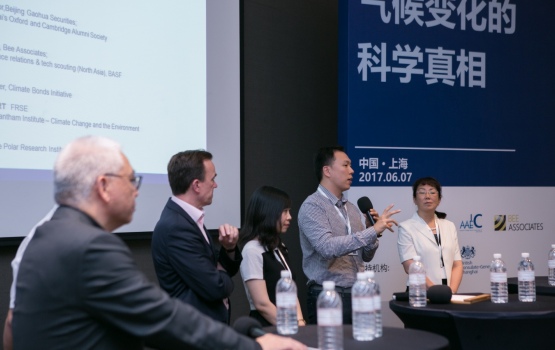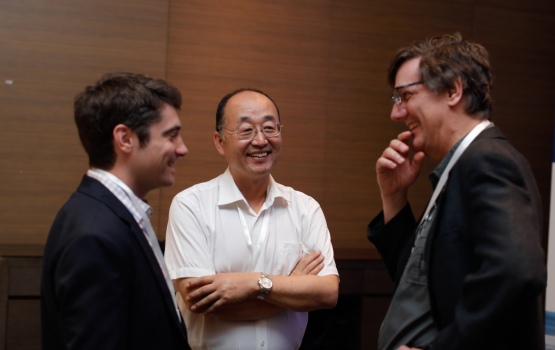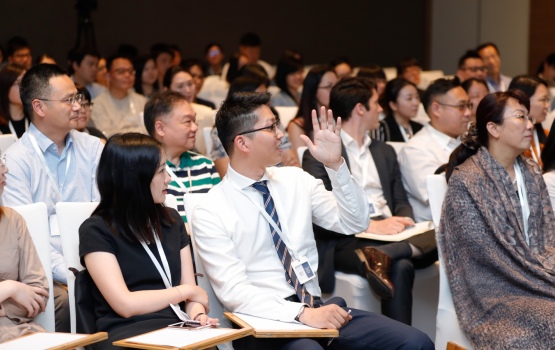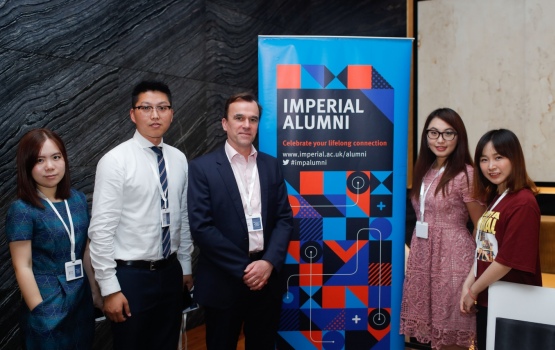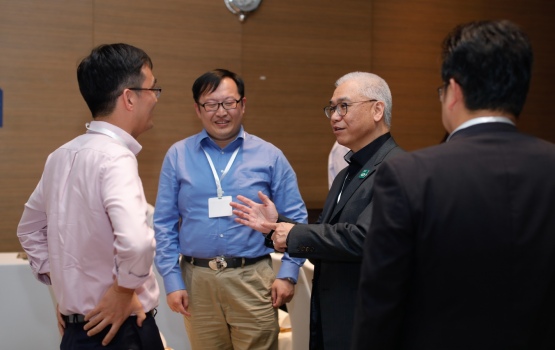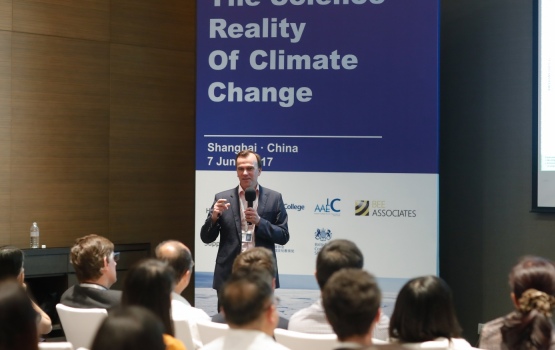Climate change on the agenda at Imperial event in Shanghai
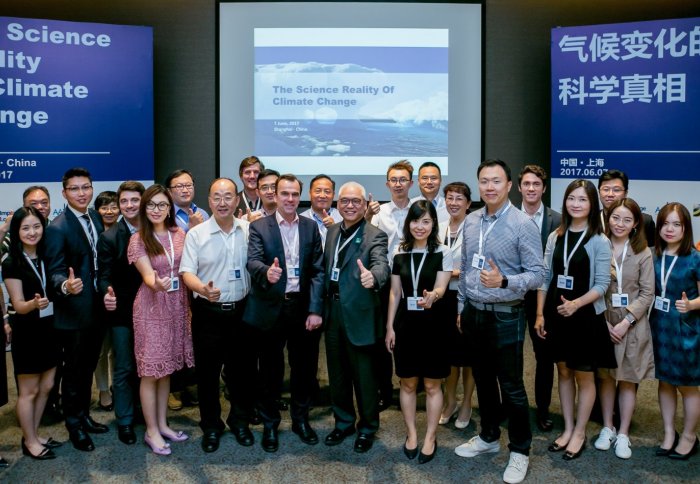
Members of Shanghai's business community, Imperial alumni and other UK universities discussed the 'important issue' of climate change last week.
A hundred people gathered to hear a keynote speech by one of the College’s most senior climate change experts, followed by a panel discussion with Chinese business leaders, at an event discussing the extent of climate change and solutions to the challenges it poses.
Alumni from Imperial and other UK institutions and prominent members of Shanghai’s business community heard how increased greenhouse gas emissions have led to global warming and how focused collaboration between academia and business is required to limit its effects or adapt to the predicted environmental changes.
Professor Martin Siegert, co-director of the Grantham Institute - Climate Change and the Environment, and professor of Antarctic geosciences (pictured below right with guest) delivered a keynote presentation highlighting the latest findings in climate change science including the extent of rising sea-levels and increase in extreme weather events.
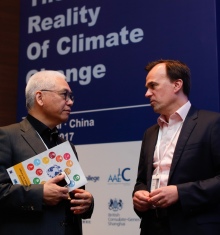 He also talked about the global efforts to reduce the reliance on technologies that emit greenhouse gases like carbon dioxide, following the United Nations’ Paris Agreement, saying, “The worst effects of global warming will be less damaging and less expensive to avoid if we eliminate greenhouse gas emissions from human activities now. If we don’t act now, it will definitely be much more costly, but also may not be possible.”
He also talked about the global efforts to reduce the reliance on technologies that emit greenhouse gases like carbon dioxide, following the United Nations’ Paris Agreement, saying, “The worst effects of global warming will be less damaging and less expensive to avoid if we eliminate greenhouse gas emissions from human activities now. If we don’t act now, it will definitely be much more costly, but also may not be possible.”
If we don’t act now, it will definitely be much more costly, but also may not be possible.
– Professor Martin Siegert
Co-Director of the Grantham Institute
Alumnus Johnny Kwan (Chemical Engineering 1978, MSc Management Science 1979), former Chairman of BASF Greater China organised the event, which was entitled ‘The science reality of climate change’.
He said, “We are making good progress to replace fossil fuels with renewable energy but we just need to be consistent and persistent in what we are doing. I was pleased to have an opportunity to bring alumni and guests together to discuss this issue, which can only be tackled if all sectors of society work together.”
Improving efficiency to tackle climate change
A panel of experts from academic, business and financial institutions debated possible solutions to the problem of climate change. Dr Sun Bo, Deputy Director of the Polar Research Institute of China, commented: “It is an extraordinary experience to spend months in the Antarctic area, we have limited resources and a strict discipline to minimise the environmental footprint. The contrast with developed cities is astonishing, where we have abundant resources and create plenty of waste too.”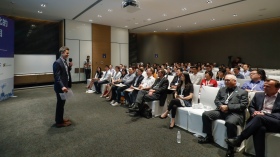
Panellist Dr Ma Lian, Associate Consultant at Bee Associates, and the former Head of Science Relations and Technology Scouting (North Asia) at BASF, feels positive about the role that science can play in mitigating climate change. “I am so proud of being a chemist”, she said, “Because chemistry can generate innovative solutions to improve energy efficiency and reduce carbon footprints in many aspects of our life – from lightweight materials for vehicles to insulation technology in housing.”
Solutions receive financial backing in China and Britain
Other solutions discussed included the opportunities presented by green financing, whereby companies can access funding grow a low-carbon business idea. Ms Shao Huan, General Manager China Office for Climate Bonds Initiative, who also joined the panel, said, “Green finance is vital to a green future. It has a major role to play in mobilising private capital for green investments that deliver environmental benefits. China is so committed to green finance that under its proposal, the G20 approved to establish a G20 Green Finance Study Group, co-chaired by the central banks of China and Britain, to support the transition to a low-carbon and climate-resilient economy."
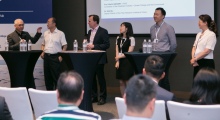 Panelist Steven Luk works as a Private Wealth Advisor at Beijing Gaohua Securities. He highlighted the importance of individual action: “We shouldn't see the climate change problem as the "other person's issue". We can all positively contribute to climate change, starting from not wasting energy and not wasting food in our life.” He also said that, “We need to educate green start-up investors so they have a longer term balanced growth perspective and not chase after short term gains."
Panelist Steven Luk works as a Private Wealth Advisor at Beijing Gaohua Securities. He highlighted the importance of individual action: “We shouldn't see the climate change problem as the "other person's issue". We can all positively contribute to climate change, starting from not wasting energy and not wasting food in our life.” He also said that, “We need to educate green start-up investors so they have a longer term balanced growth perspective and not chase after short term gains."
A pressing international challenge
Matthew Knowles, Area Director for East China at the British Council, and Consul (Cultural and Education) for the British Consulate-General in Shanghai, says, “Climate change is without question one of the greatest challenges of our time, a challenge we can only hope to address with a bedrock of trust between countries, with mechanisms that allow our institutions, our brilliant scientists and technologists, our artists and writers to work together and protect the prosperity and security of future generations.”
The seminar was co-hosted by Imperial College London, Bee Associates and the Imperial College Alumni Association of East China (ICAAEC), and it was supported by the British Council (Cultural and Education Section of the British Consulate General), and British Consulate-General Shanghai.
See a slideshow of images from the event
Article text (excluding photos or graphics) © Imperial College London.
Photos and graphics subject to third party copyright used with permission or © Imperial College London.
Reporter
Jenn Rowater
Advancement
Jessica Adams
Advancement
Simon Levey
Communications Division
